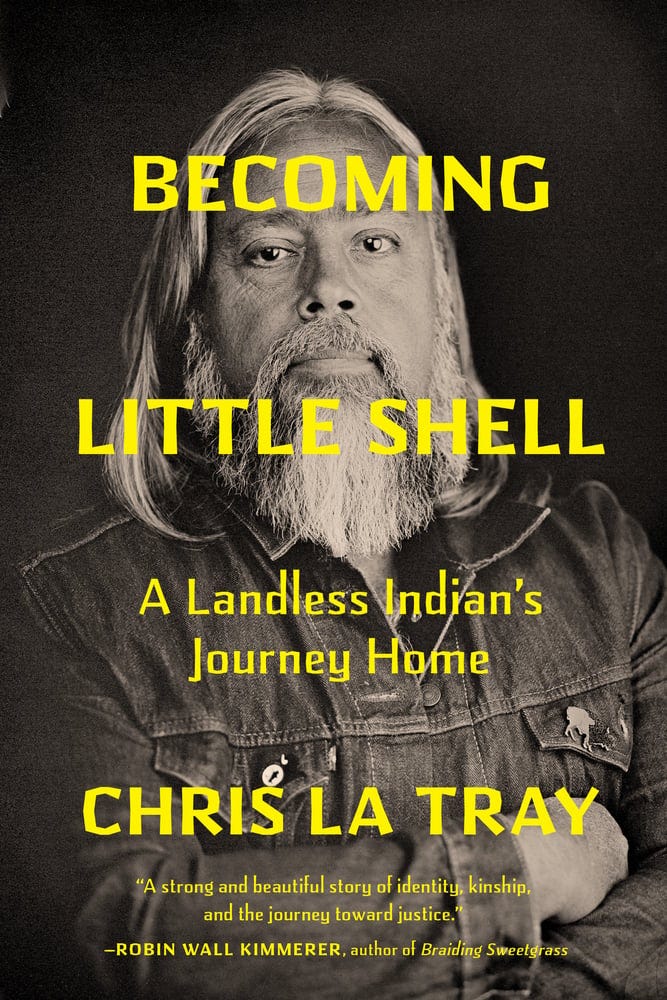An intimate memoir of landlessness and identity in Montana's forgotten tribe
A review of Chris La Tray’s book Becoming Little Shell
I always thought there were only two types of memoirists: the self-absorbed and the ineffectual. Chris La Tray’s new book Becoming Little Shell is convincing me there might be a third.
Writing a memoir is trickier than it looks. You have to use language well. (La Tray is Montana’s poet laureate.) You have to have a good story. (La Tray is a heavy metal guitarist who never took a poetry class.) And you have to be willing to wallow in that story: to sit in the senses and emotions of a given moment for far longer than most of us would care to. This is where self-absorption becomes a virtue, because you’re going to have to sweat blood to make that moment come alive for a reader, and then do it over and over again to compile a bunch of such moments into a meaningful narrative.
La Tray’s task is easier than some, because Becoming Little Shell is half memoir and half history. It’s the personal story of his discovery of his Indianness, despite his father’s lifelong denials, alongside the story of the Little Shell Tribe of Chippewa Indians itself, which received federal recognition only in 2020. These are twinned chronicles of becoming Little Shell.
I’ll admit, I was drawn more by the history than the memoir. To learn about Montana’s Métis culture, I’ve twice tried reading Joseph Kinsey Howard’s book Strange Empire, but apparently lacked some level of background knowledge needed to make sense of it. In Becoming Little Shell, I get it. That’s in part due to this half-memoir structure, where La Tray learns this history alongside us.
On that educational journey, I increasingly came to appreciate the book’s memoir elements. As La Tray describes one of his most transformative moments, listening to an author presentation at the 2014 Montana Festival of the Book, I realized that I was there too, in Missoula’s Holiday Inn Ballroom D for the 2:30 p.m. session, where I arrived late because I’d also checked out a concurrent panel on Nature Writing. La Tray captures the scene perfectly, while also describing its impact on him personally.
Métis is French for mixture, and refers to people of mixed Indigenous and European ancestry. So one fascinating element of the book for me was the story of a tribe becoming a “tribe.” After all, today’s federal designations are settler-imposed categories, full of settler-imposed systems such as blood quantum, the allegedly-scientific way of judging how “pure” is your tribal blood.
La Tray may feel a deep connection to his tribe’s culture, including the leadership of three successive chiefs named Little Shell and the development of wooden Red River Carts that were the first land-based (as opposed to river-based) transport system across the Plains. But to become Little Shell, he must prove that his ancestors were legitimate members of a tribe whose long-ago membership rolls were manipulated by settlers during treaty negotiations.
Some Métis bands followed leaders who signed treaties that put them on reservations in North Dakota or Montana. But Chief Little Shell refused to sign, and his followers and descendants became known—to the few who knew anything about them—as Montana’s Landless Indians. That helps explain why they scattered—from Choteau to Lewistown to Great Falls to La Tray’s own Missoula. They had no land. They had to rent. Many, like La Tray’s father, decided to just pass as white.
Maybe that was the goal of America’s now-we-see-it-as-cruel Indian policy: to turn them into whites. And here’s where the memoir format proves especially valuable: As La Tray describes his mid-2000s IT job—staying in a series of cookie-cutter Midwestern chain motels while spending his days in manufacturing plants with zero connection to the surrounding landscape—we feel the soullessness of so much settler culture. We see how relation to a culture is so important to personal fulfillment. We’re almost jealous of his tribal connection. His journey to becoming Little Shell has stakes: he needs this status. And thus so does the tribe.
Becoming Little Shell is a vibrant, charmingly-written book telling stories both intimate and important. It has immediately become one of my favorites.
Discussion:
The book isn’t officially released (from Milkweed Editions) until August 20. I was able to write this review today because my pre-ordered hardcover arrived early.
If you order the book here, I get a commission. But I’d be just as happy if you supported a local independent bookstore!
Welcome to those of you arriving from my op-ed about Montana politics. In this weekly newsletter, I tell stories about people and nature (this week is a bit of an exception, reviewing someone else’s story). Could you support me by signing up as a subscriber, or even a paying subscriber? Thanks!





Thanks for this review.
Wow, John, what an unexpected and wonderful effort to find in my notifications after being on the road for days and days! I appreciate your thoughts on this very much, and it was great to see you a couple weeks ago. Miigwech, thank you!